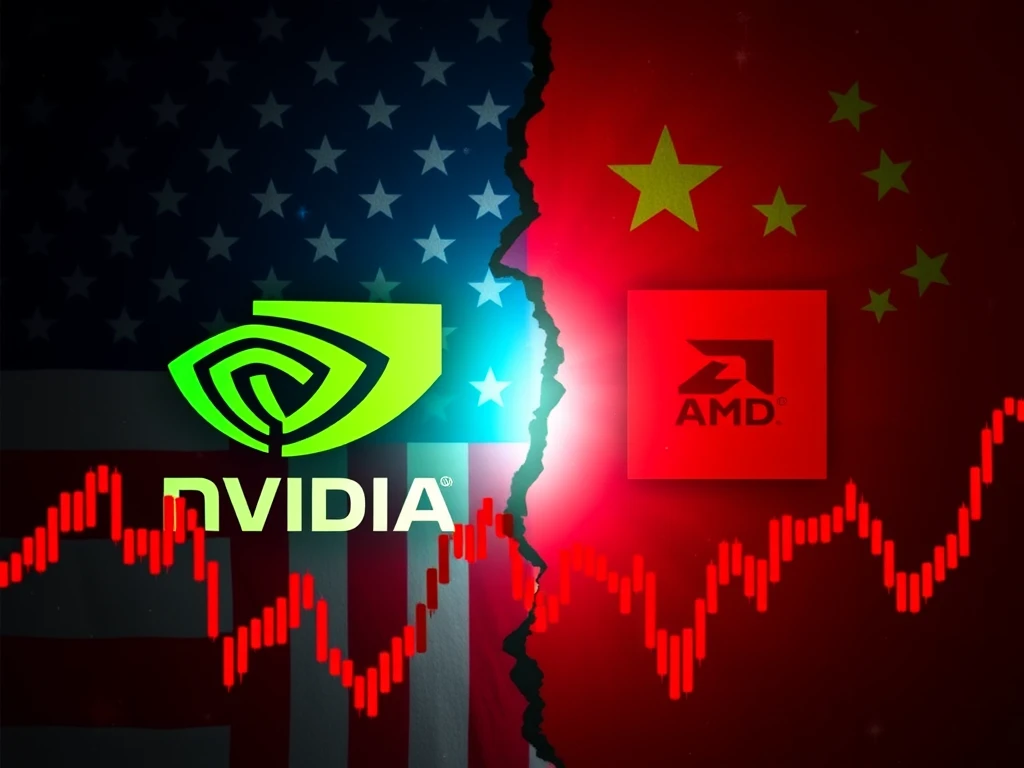Shocking Nvidia Stock Slide: $5.5B Charge Amid China AI Chip Restrictions

Buckle up, crypto and tech enthusiasts! The stock market is experiencing tremors as chipmaking giants Nvidia and AMD face a significant downturn. Why? U.S. restrictions on exporting advanced AI chips to China have thrown a wrench into Nvidia’s revenue projections, potentially costing them a staggering $5.5 billion. Let’s dive into what’s causing this market ripple and what it means for the tech world.
Why are Chipmaker Stocks Sliding?
The core issue stems from escalating U.S.-China trade tensions, specifically concerning advanced technology. The U.S. government has tightened export controls on high-performance AI chips, fearing they could enhance China’s supercomputing capabilities. This move directly impacts companies like Nvidia, which heavily relies on the Chinese market for its AI chip sales. The ripple effect is being felt across the entire chipmaker stocks sector.
Nvidia’s $5.5 Billion Hit: A Breakdown
Nvidia’s recent regulatory filing revealed the grim reality: potential charges of up to $5.5 billion. This financial burden is directly linked to:
- Inventory Write-downs: Nvidia holds a significant inventory of its H20 AI chips, specifically designed for the Chinese market. With new export restrictions, these chips may become unsellable in China, leading to substantial write-downs.
- Purchase Commitments: The company has existing purchase commitments for components and manufacturing related to these now-restricted chips. These commitments translate into financial obligations even if the final products cannot be exported.
- Related Reserves: Nvidia is setting aside reserves to cover potential losses and uncertainties arising from these export limitations.
The restrictions are explicitly targeted at China, Hong Kong, and Macau, highlighting the geopolitical undertones of this tech trade war. The U.S. government’s concern is that these powerful AI chips could be diverted to or used in supercomputers within China, potentially impacting national security.
The China Restrictions Bite: Impact on Nvidia and AMD
Nvidia’s stock (NVDA) reacted sharply, plummeting 6% in after-hours trading. This isn’t an isolated incident; Nvidia’s shares are already down 22% year-to-date, reflecting broader market anxieties and now, these specific China restrictions.
Rival AMD (Advanced Micro Devices) is also feeling the heat. Their stock price mirrored Nvidia’s decline, dropping over 7% in after-hours trading. AMD shares have fallen more than 25% since the start of the year, indicating a sector-wide vulnerability to these geopolitical and economic pressures.
| Company | Stock Ticker | After-Hours Stock Change | Year-to-Date Stock Change |
|---|---|---|---|
| Nvidia | NVDA | -6% | -22% |
| AMD | AMD | -7% | -25% |
Source: Google Finance (as of April 15 After-Hours Trading)
What’s Next for Nvidia and the Chip Market?
Nvidia’s first fiscal quarter ends on April 27th, and the upcoming earnings report will be closely watched for the actual financial impact of these China restrictions. While Nvidia announced plans to invest heavily in U.S.-based AI chip manufacturing, this long-term strategy does little to mitigate the immediate financial fallout.
Industry analysts are pointing to a larger trend of companies becoming collateral damage in escalating trade disputes. The comment from the Kobeissi Letter, “Truly no company is safe from tariffs,” resonates deeply in this context.
Navigating the Stock Slide: Key Takeaways
For investors and market observers, here are some crucial takeaways:
- Geopolitical Risks are Real: This situation underscores the significant impact of geopolitical tensions on the tech sector, particularly for companies with global supply chains and markets.
- Diversification is Key: Companies heavily reliant on single markets, like China in this case, face heightened risks when trade policies shift. Diversifying markets and manufacturing locations becomes increasingly important.
- Monitor Regulatory Changes: The tech industry must closely monitor and adapt to evolving export regulations and trade policies, as these can have immediate and substantial financial consequences.
- Market Volatility Expected: Expect continued volatility in chipmaker stocks as the U.S.-China trade relationship remains uncertain and as companies navigate these new restrictions.
In Conclusion: A Turning Point for Tech?
The stock slide of Nvidia and AMD serves as a stark reminder of the interconnectedness of global economies and the vulnerabilities of tech giants to political winds. As the U.S. and China continue to navigate their complex relationship, the tech world will likely see more ripples and adjustments. Investors should remain vigilant, and companies must strategize for a future where geopolitical considerations are as crucial as technological innovation. The road ahead for chipmaker stocks and the broader tech landscape is filled with uncertainty, demanding resilience and adaptability.









